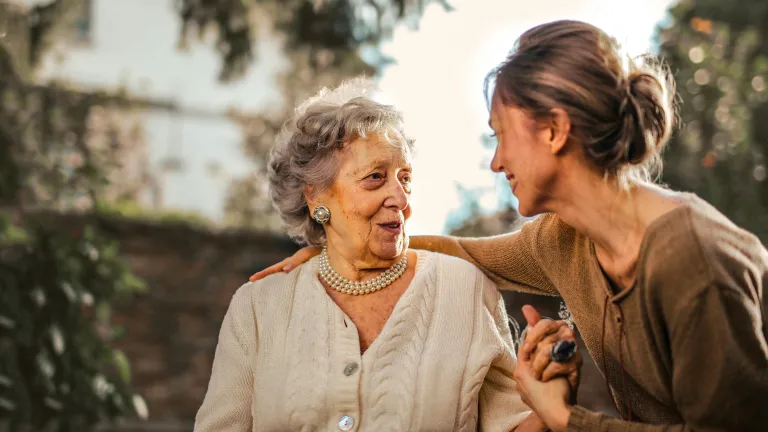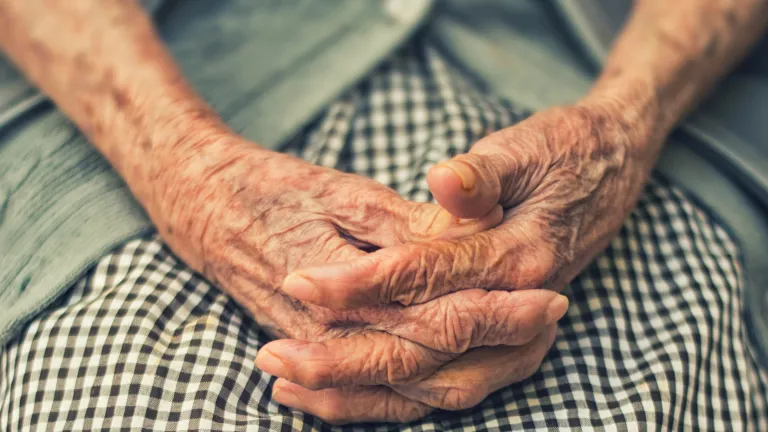Family Caregivers, Please Take Good Care of Yourselves!

The previous article, “Care About the Caregivers,” explained how family caregivers fulfill many kinds of critical needs, and how we can recognize, appreciate and pray for them. This article offers advice and encouragement to the caregivers.
A family caregiver is a person who willingly helps take care of a loved one in time of need. The needs of the loved one can be minor or major and often become greater as time goes by. Assistance might be needed for a short time or a long time. Quite often, the loved one needs assistance for the remainder of their life.
Family caregivers are generally motivated by heartfelt love and compassion as well as a conscientious sense of duty. They usually hope that the loved one will not need to live in a nursing home. A caregiver for a parent is usually motivated by deep gratitude because of the many years the parent was caring for his or her needs.
However, whether the person is the sole caregiver, the primary caregiver or a part-time helper, a caregiver must take care of his or herself as well if he or she is to endure for long. Often, the role of a caregiver includes multiple daily (and often nightly) responsibilities that are in addition to all of their normal responsibilities with family, health, job, home, etc. And the needs, duties and sacrifices often become increasingly complex and difficult as time goes by.
Hence, self-sacrificing caregiving often becomes very stressful, even overwhelming, physically and mentally.
Professional caregivers such as home-health nurses can also experience major stress but the limited hours plus the financial compensation help to limit the stress. Not so with family caregivers.
This subject applies directly to countless people! Many of you readers are serving as a family caregiver, have been a family caregiver, or will be a family caregiver! One reliable estimate says that one in four adult children will be a caregiver for a parent!
Who takes care of a family caregiver?
Who takes care of the caregiver? Often no one except God and the caregiver himself or herself! It’s a blessing when other family members help out, but usually most of the work falls on the shoulders of one person.
Long-term daily caregiving often becomes exhausting and highly stressful—to the point that the caregiver needs a caregiver!
This article is a plea to each caregiver: Please learn how to take good care of yourself—physically, mentally and spiritually—so you can survive and thrive and not wreck your own health or burn out!
Should you love yourself?
True Christians know the Bible well enough to know that they should not be self-centered “lovers of themselves” in the sense meant in 2 Timothy 3:2. However, many Christians are confused, thinking that any kind of love for oneself is wrong.
The second great commandment says, “you shall love your neighbor as yourself” (Leviticus 19:18, emphasis added throughout). This proves that God designed us and expects us to love ourselves! In the Bible, “love” is usually a verb and usually refers to actions rather than feelings. Hence, God holds us responsible for taking care of ourselves! Then when needs of others arise, we will have the health and stamina to help our “neighbors.”
Sometimes we sacrifice our own desires to care for the needs of someone else. Jesus said: “This is My commandment, that you love one another as I have loved you. Greater love has no one than this, than to lay down one's life for his friends” (John 15:12-13). However, a caregiver must think long-term. It’s a serious mistake for them to sacrifice their own health and then be unable to endure as a caregiver.
On plane flights, a flight attendant addresses the passengers about safety. The attendant says that in the case of an emergency, a parent of a young child should put their own oxygen mask on before putting one on their child. This might sound surprising and selfish at first, but realize that the parent and child could both die if the parent is immediately struggling to get an oxygen mask on the child. The lesson? If a caregiver doesn’t take sufficient care of his or herself, he or she eventually won’t be able to take good care of anyone else.
Keys to enduring long-term!
For a caregiver to survive and thrive, the number one key is to stay close to God. One’s physical, mental and emotional strength needs the foundation of spiritual strength. Try to live each day by Philippians 4:4-9— make your requests to God, don’t be anxious, seek peace, rejoice, think on these things.
A caregiver needs a workable schedule. It’s ideal if the caregiver can spend time in Bible study, prayer and meditation the first thing in the morning before the patient gets up. He can pray for God to help him with his many challenges and for God to fill him with the fruits of the Holy Spirit listed in Galatians 5:22-23. It’s also valuable to be specific in prayers throughout the day—asking God for His help with each new task.
Many caregivers worry a lot. We need to be reminded of the words of Jesus in Matthew 6:25-34 in which He admonished us to not worry, but, instead, to trust in God to provide our needs. Verse 34 is especially significant. It says: “Therefore do not worry about tomorrow, for tomorrow will worry about its own things. Sufficient for the day is its own trouble.” The healthy kind of “worry” is your decision-making and problem-solving, but try to stay focused on the present needs and challenges. Avoid having fear, apprehension and anxiety about the future.
Secondly, a person new to caregiving should quickly educate themself about that complex role. The book of Proverbs repeatedly urges us to seek knowledge, understanding and wisdom! Thankfully, there are many books and websites that offer thorough understanding and advice about caregiving.
Very sadly, many elderly people develop dementia. A caregiver for someone with increasing dementia must gain a lot of additional knowledge in order to properly deal with that major challenge.
Thirdly, caregivers often push themselves too hard. They must be realistic about what they can and cannot do long-term. Furthermore, if the patient’s health continues to deteriorate, the patient needs more and more help with basic needs. Additionally, a patient who doesn’t feel well often becomes increasingly critical, complaining and demanding. This certainly puts additional stress and discouragement on the caregiver.
Hence, caregivers need to take breaks! “He who rests cares best.” They need to observe a restful Sabbath each week as best they can. Note that Jesus Christ took breaks! (Luke 5:15-16). One type of break is discovering ways that you and the patient can enjoy some amusement together!
If a caregiver becomes exhausted or his health breaks down, he or she can no longer provide the care that is essential for the patient. Many caregivers eventually give up and abandon that role. They have experienced burn-out.
Fourthly, seek helpers! Besides asking God for help, ask people to help! If the patient has round-the-clock needs, please avoid being a sole caregiver!
Even being a primary caregiver, with others to help fill in, is often a heavy responsibility. If a caregiver is “on duty” every day and night, how can the caregiver get enough rest and sleep—some R and R (rest and recharging)?
Please don’t feel embarrassed or ashamed about asking for help! When challenges start becoming overwhelming, ask God to help you to find people, services or agencies that can give you relief and help so you are not stretched too thin. Your helper can be a family member or friend or a professional like a visiting nurse. Besides needing physical help, you’ll need a shoulder to cry on.
Lastly, let’s keep in mind that God is our great Caregiver who urges us to regularly ask Him for His help. Also keep in mind that God will richly reward you and bless you for your loving sacrifices for others. Many scriptures tell us that God never forgets our labors of love and how those labors will be richly rewarded when Jesus Christ returns and establishes His Kingdom here on earth!






